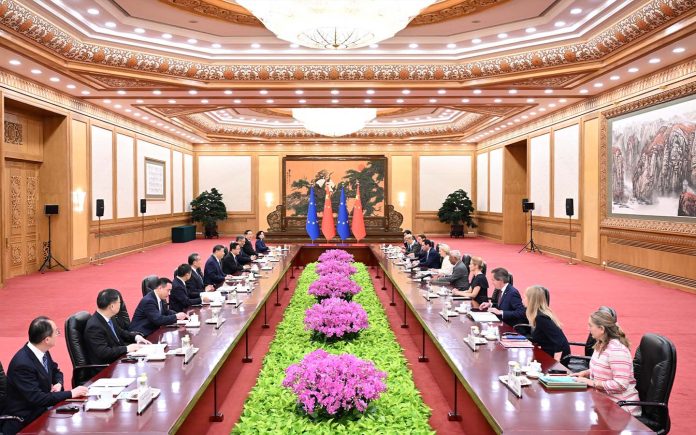The China-EU summit, timed to mark the 50th anniversary of the establishment of diplomatic relations, took place in Beijing. However, the meeting ended early amid growing tensions between the two sides, Chinese media reported on Thursday.
European Commission President Ursula von der Leyen said that bilateral relations needed to be reviewed, reflecting the growing confrontation between the world’s second and third largest economies, the European Union ($19.4 trillion) and China ($18.7 trillion), with the United States ($29.2 trillion) in the lead. The tension was so serious that the summit programme was cut from two days to one.
Against the backdrop of heated discussions, a photo of Xi Jinping, von der Leyen and European Council President António Costa holding hands stands out in stark contrast. At the beginning of the summit, von der Leyen praised China for lifting 800 million people out of poverty through technological progress, calling this achievement a source of inspiration for the whole world.
However, her rhetoric then became much tougher: she called for a “reset” of relations, expressing dissatisfaction that Chinese exports, supported by cheap loans, were undermining EU industry. China’s trade surplus with Europe exceeded $350 billion.
Von der Leyen stressed the need to “rebalance” economic co-operation and called on China to exert influence on Russia. In the absence of reciprocal steps, she threatened to impose restrictions on Chinese imports.
Xi Jinping, in his speech at the Great Hall of the People, struck a more conciliatory tone, calling for mutual understanding and trust. He noted that the challenges facing Europe do not originate in China and stressed the importance of strategically balanced decisions by Brussels and Beijing in the context of global instability.
The visit of European leaders to Beijing comes against the backdrop of a changing global balance of power and the EU’s desire to play a more active role on the international stage, including in relations with the East.
